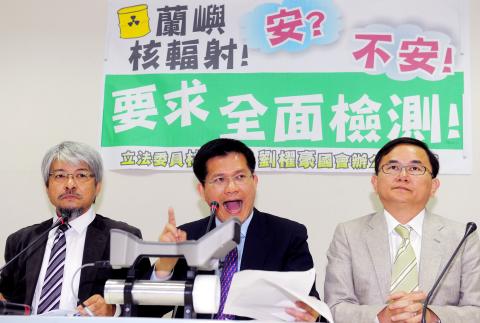Democratic Progressive Party (DPP) lawmakers and several academics yesterday told a press conference that the nuclear radiation level in Lanyu (蘭嶼), also known as Orchid Island, was a serious concern and demanded a complete investigation into potential radiation threats on the island.
Katsumi Nakao of J.F. Oberlin University and Yoh Kato of Tokyo Metropolitan University, who were invited by the Atomic Energy Council to conduct radioactivity tests on the island on Nov. 10 and Nov. 11, decried the detection results announced by the council, saying the real levels were significantly higher than those reported by the council.
The council yesterday reaffirmed the safety of the island, where a nuclear waste storage facility is located, after joint readings by Nakao, Kato and five Taiwanese professors.

Photo: CNA
It said the tests done by different units all showed that readings of radiation levels were within the variation of environmental background radiation, so tourists should not be worried about visiting the island.
The council said it had invited the Council of Indigenous Peoples, the Taitung County government, local representatives and environmentalists to the island to check radiation levels between Sept. 11 and Sept. 17, and also invited specialists from Taiwan and Japan along with specialists from the council’s Radiation Monitoring Center to test the environment radiation levels on Nov. 10 and Nov. 11.
It said that while Japanese specialists discovered abnormal levels of radiation around a cement wall in Langtao Village’s (朗島) former health center, the tests done by specialists from three Taiwanese units showed that radiation levels were within safety limits.
After analyzing the radiation testing devices used by the Japanese specialists on Friday, the council said it discovered that the devices might have been affected by electromagnetic waves from mobile phone base stations, so the readings did not effectively measure non-ionizing radiation leaked from nuclear waste on the island.
Both Kato and Nakao said the radiation level at Langtao Village detected by their equipment was “unusually high,” while the council said no abnormal data had been detected.
The Japanese professors later donated their detection equipment to Lanyu residents.
Taipei Medical University professor Chang Wu-shou (張武修), who was on the research team, said the council’s detection equipment was of questionable reliability.
DPP legislators Lin Chia-lung (林佳龍), Liu Chao-hao (劉櫂豪), Gao Jyh-peng (高志鵬) and Ho Shin-chun (何欣純) accused the council of lying to Lanyu residents.
In addition, Lin said that the council had lost its credibility.
“That was why they [Lanyu residents] would rather trust the Japanese professors than the government agencies,” Lin said.
Thirty years after the storage facility was built without prior consultation and communication with Lanyu residents, the government has yet to conduct a complete investigation of nuclear radiation on the island, Lin said.
With the council’s credibility in question, Liu Chao-hao said an independent institution or research team should be brought in to conduct a thorough inspection of radiation levels on the island.
The council was accused of malpractice concerning nuclear waste repackaging in Lanyu last month.

Chinese Nationalist Party (KMT) Chairman Eric Chu (朱立倫), spokeswoman Yang Chih-yu (楊智伃) and Legislator Hsieh Lung-chieh (謝龍介) would be summoned by police for questioning for leading an illegal assembly on Thursday evening last week, Minister of the Interior Liu Shyh-fang (劉世芳) said today. The three KMT officials led an assembly outside the Taipei City Prosecutors’ Office, a restricted area where public assembly is not allowed, protesting the questioning of several KMT staff and searches of KMT headquarters and offices in a recall petition forgery case. Chu, Yang and Hsieh are all suspected of contravening the Assembly and Parade Act (集會遊行法) by holding

PRAISE: Japanese visitor Takashi Kubota said the Taiwanese temple architecture images showcased in the AI Art Gallery were the most impressive displays he saw Taiwan does not have an official pavilion at the World Expo in Osaka, Japan, because of its diplomatic predicament, but the government-backed Tech World pavilion is drawing interest with its unique recreations of works by Taiwanese artists. The pavilion features an artificial intelligence (AI)-based art gallery showcasing works of famous Taiwanese artists from the Japanese colonial period using innovative technologies. Among its main simulated displays are Eastern gouache paintings by Chen Chin (陳進), Lin Yu-shan (林玉山) and Kuo Hsueh-hu (郭雪湖), who were the three young Taiwanese painters selected for the East Asian Painting exhibition in 1927. Gouache is a water-based

Taiwan would welcome the return of Honduras as a diplomatic ally if its next president decides to make such a move, Minister of Foreign Affairs Lin Chia-lung (林佳龍) said yesterday. “Of course, we would welcome Honduras if they want to restore diplomatic ties with Taiwan after their elections,” Lin said at a meeting of the legislature’s Foreign Affairs and National Defense Committee, when asked to comment on statements made by two of the three Honduran presidential candidates during the presidential campaign in the Central American country. Taiwan is paying close attention to the region as a whole in the wake of a

OFF-TARGET: More than 30,000 participants were expected to take part in the Games next month, but only 6,550 foreign and 19,400 Taiwanese athletes have registered Taipei city councilors yesterday blasted the organizers of next month’s World Masters Games over sudden timetable and venue changes, which they said have caused thousands of participants to back out of the international sporting event, among other organizational issues. They also cited visa delays and political interference by China as reasons many foreign athletes are requesting refunds for the event, to be held from May 17 to 30. Jointly organized by the Taipei and New Taipei City governments, the games have been rocked by numerous controversies since preparations began in 2020. Taipei City Councilor Lin Yen-feng (林延鳳) said yesterday that new measures by